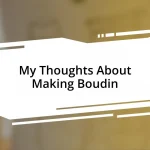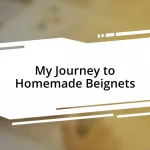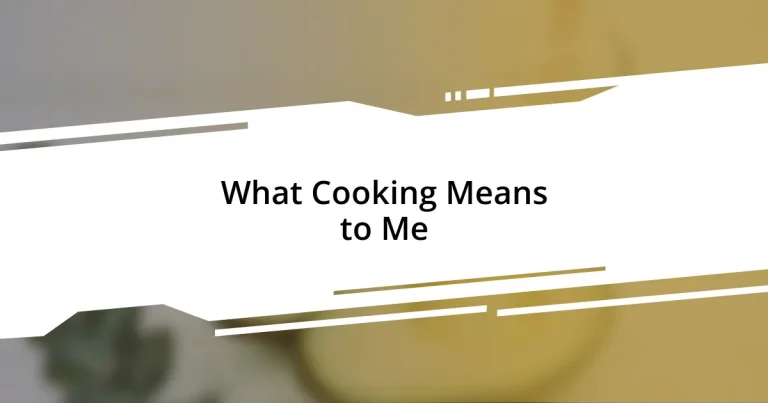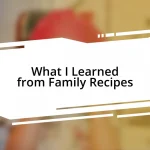Key takeaways:
- Cooking is a therapeutic ritual that connects the author to memories and roots, fostering emotional well-being.
- Failures in cooking lead to valuable lessons, turning mishaps into creative opportunities and encouraging perseverance.
- Cooking serves as a creative outlet, allowing experimentation with flavors and presentation, while also reflecting personal emotions.
- It fosters connections among people, transforming meals into shared experiences full of stories and laughter.
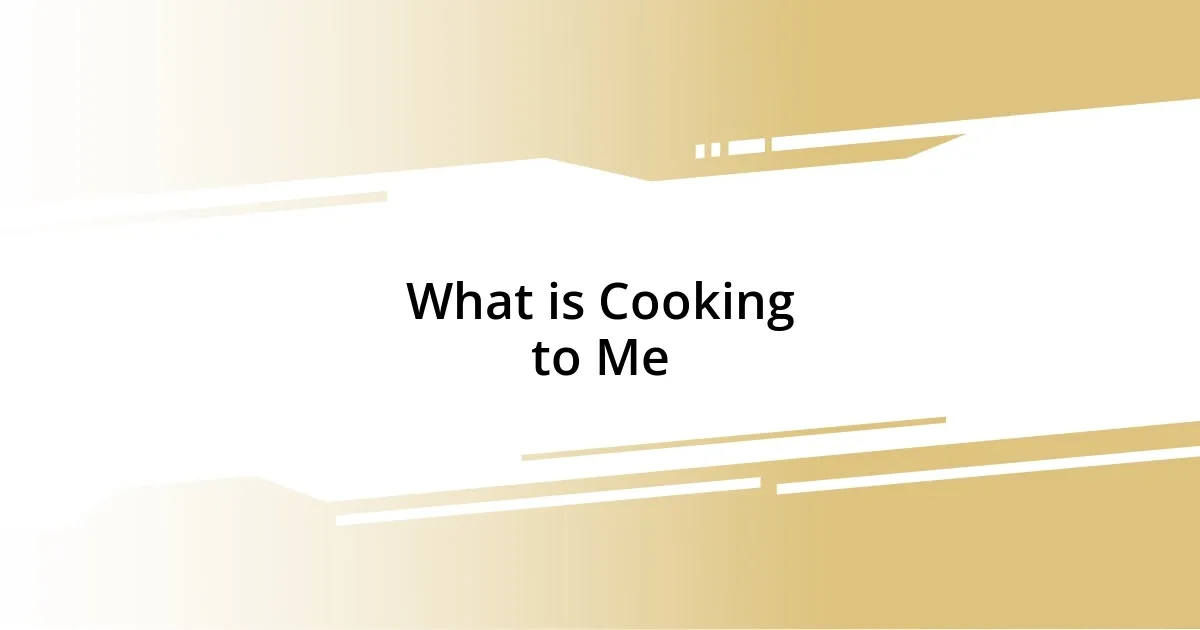
What is Cooking to Me
Cooking, to me, is more than just a routine task; it’s a sacred ritual. I remember a rainy Sunday afternoon when I decided to whip up my grandmother’s famous chicken soup. As I sliced the onions and garlic, the aromas took me back to her kitchen, flooding me with warmth and nostalgia. Isn’t it incredible how food can connect us to our roots?
For me, cooking is also a form of therapy. After a long week, standing in front of the stove helps clear my mind. I often find solace in chopping vegetables or stirring a simmering pot. It’s a space where I can let my thoughts flow freely. Have you ever noticed how certain recipes can reflect your mood?
Finally, cooking gives me the joy of sharing experiences with others. I cherish those moments when friends gather around my dining table, laughter mingling with the fragrance of the meal. I still recall the unexpected delight of watching my friends savor the dish I had perfected after numerous attempts. It’s an encouraging reminder that cooking is not just about feeding the body; it’s about nourishing connections.
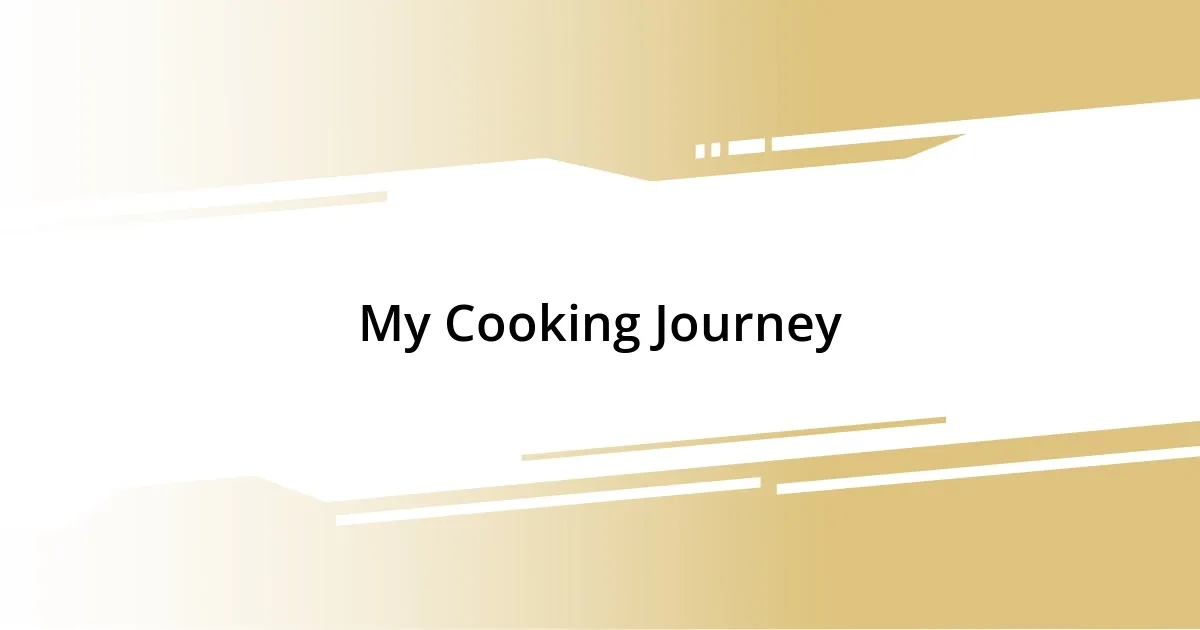
My Cooking Journey
My cooking journey started in my tiny apartment kitchen, where every meal was an experiment. I remember trying to make my first risotto. The process was intimidating—watching the rice slowly absorb the broth felt like waiting for a dream to come true. Each stirring released my apprehensions, and when that creamy dish finally came together, I felt an exhilarating sense of accomplishment. Have you ever had that “aha!” moment in the kitchen? It’s thrilling when something you cook turns out even better than you hoped.
Over the years, I’ve discovered that cooking is about embracing failure just as much as it’s about celebrating success. I can’t help but smile when I recall the time I overcooked a chocolate cake into an accidental brownie. Rather than tossing it out, I embraced it, topping it with homemade ice cream. Interestingly, that unexpected creation became a birthday favorite among my friends. It’s moments like these that showed me cooking is truly an adventure, often leading to delightful surprises.
Each recipe I tackle feels like a chapter in a larger story. There’s just something special about my grandmother’s handwritten recipe cards, which, over time, have become worn and stained. I often find myself reminiscing as I read her notes—her little tips and tricks guiding my hands. Cooking her dishes feels like carrying on a legacy, and each meal becomes an opportunity to honor our shared experiences. It’s these connections to the past that deepen my love for cooking, making each meal an emotional journey.
| Cooking Experience | Emotion and Insight |
|---|---|
| First Risotto | Excitement and Accomplishment |
| Overcooked Chocolate Cake | Embracing Failure and Creativity |
| Grandmother’s Recipe Cards | Cherishing Memories and Legacy |
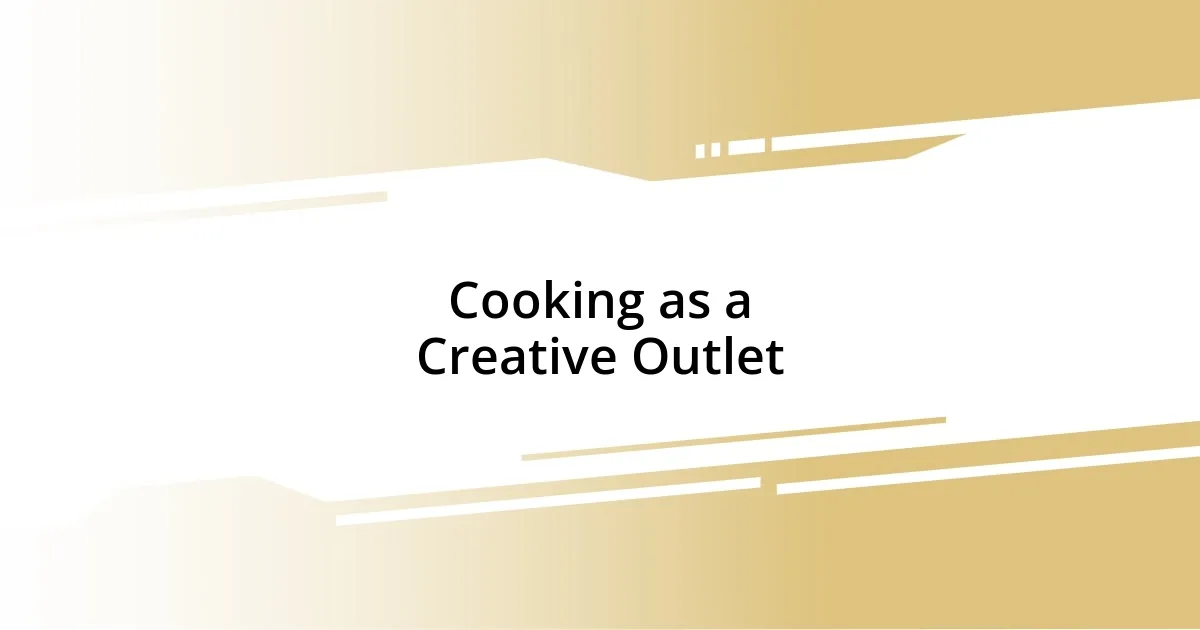
Cooking as a Creative Outlet
Cooking has always been a canvas for my creativity. There’s something magical about taking simple ingredients and transforming them into a masterpiece. I vividly recall the day I decided to experiment with a fusion dish—Thai-inspired tacos. As I mixed the spicy peanut sauce with fresh vegetables and perfectly grilled chicken, it felt as though I was painting with flavors. The moment a friend took that first bite and exclaimed, “This is genius!” was exhilarating; it showed me that cooking allows me to express myself artistically.
Here are some ways cooking acts as a creative outlet for me:
- Experimentation: Trying out new flavor combinations pushes me to think outside the box.
- Presentation: Plating a dish becomes an art form, where I can visually showcase my culinary creations.
- Mood Reflection: I often cook based on how I feel, letting my emotions guide the dishes I choose to create.
- Cultural Exploration: Preparing cuisines from different cultures broadens my perspective and inspires me to learn more about the world.
Engaging with food creatively feels like an ongoing journey, full of surprises and lessons. I once had an impromptu gathering and decided to concoct a dessert using whatever I had in my pantry. A mix of frozen berries, leftover cake, and a dash of whipped cream turned into a stunning berry trifle. The act of piecing it all together filled me with joy; sharing that moment with friends brought us closer. Cooking, for me, is not just about flavors—it’s about creativity in the moment and the stories behind every dish.
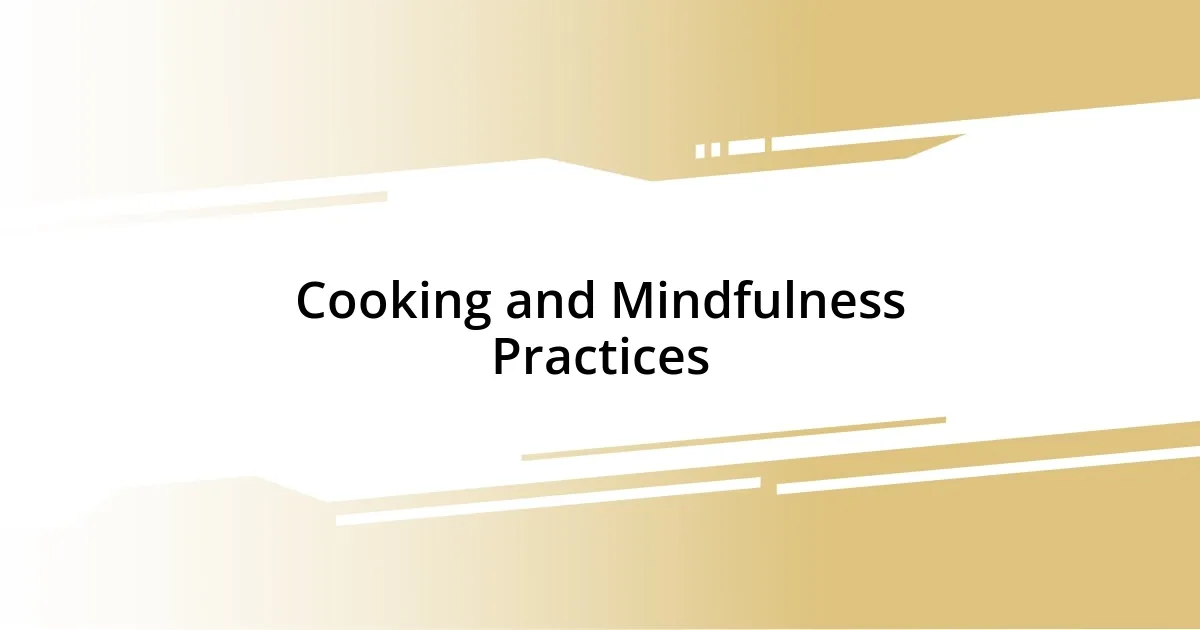
Cooking and Mindfulness Practices
Cooking has a unique way of bringing me into the present moment, almost like a form of meditation. When I chop vegetables or knead dough, my thoughts slow down, and I become aware of each slice and each fold. Have you ever noticed how the rhythm of cooking can clear your mind? For me, it’s not just about the end result; it’s about that peaceful space I create as I focus on the task at hand.
I remember a particularly hectic week when everything felt overwhelming. To counter that, I decided to make a simple pasta dish from scratch. As I rolled out the dough, the soft texture between my fingers and the fragrant aroma of garlic sizzling in the pan enveloped me in tranquility. It was as though the kitchen became my sanctuary, and every step was a way to ground myself amidst the chaos of daily life. Through moments like these, I’ve come to see cooking as a practice of mindfulness that nourishes my spirit every bit as much as it nourishes my body.
There’s something deeply satisfying about being fully immersed in the process of cooking. I often find that time seems to stand still when I’m focusing on the flavors and textures in front of me. Recently, while preparing a hearty stew, I took the time to really observe the transformation of each ingredient. Watching the vegetables soften and the broth bubble stirred a sense of connection to the food and to myself. How often do we allow ourselves to experience that kind of connection? Cooking reminds me to appreciate the small details, making even the simplest meals feel meaningful.
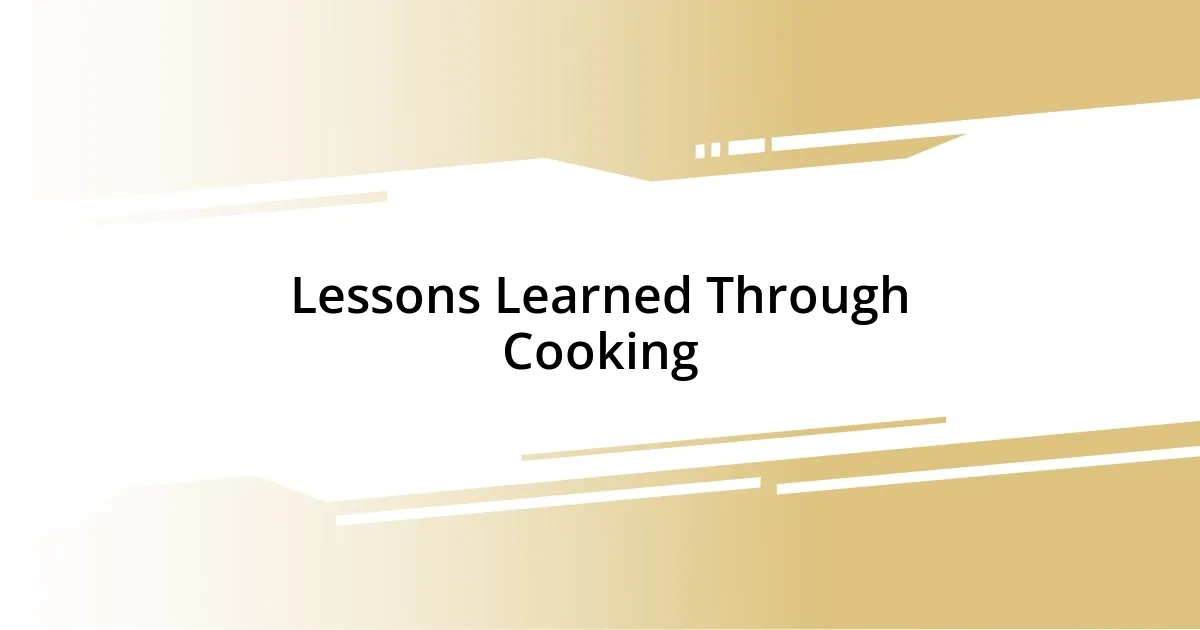
Lessons Learned Through Cooking
Cooking has taught me the value of patience. I’ll never forget the time I attempted to bake a soufflé. As I whisked the eggs, they wouldn’t come together as I’d hoped, and stress began to creep in. But in that moment, I learned that great things take time. I had to step back, breathe, and trust the process. When I finally pulled that puffed-up dish from the oven, the realization hit me: patience and perseverance pay off, both in cooking and life.
I’ve discovered how important it is to embrace failure in the kitchen. One evening, I was convinced I could whip up a delicate risotto for guests. What I ended up with was a clumpy mess that could best be described as a rice brick! Initially, I felt overwhelmed with failure, but instead of sulking, I turned it into a learning experience. I reflected on what went wrong—too much heat, too little stirring—and realized that each misstep contributed valuable lessons. It’s okay to mess up; after all, the best chefs often have their share of kitchen disasters.
Through countless hours of cooking, I’ve come to appreciate the connections that food fosters. I clearly recall a family gathering where everyone contributed a dish, and we shared stories from our pasts over each plate. The flavors combined were like a tapestry of our memories, each bite sparking laughter and conversations. Cooking has taught me that food is not just sustenance; it’s an avenue for connection, filled with history and nostalgia. Isn’t it wonderful how a simple meal can bring people together and create lasting bonds?




